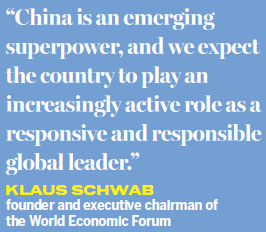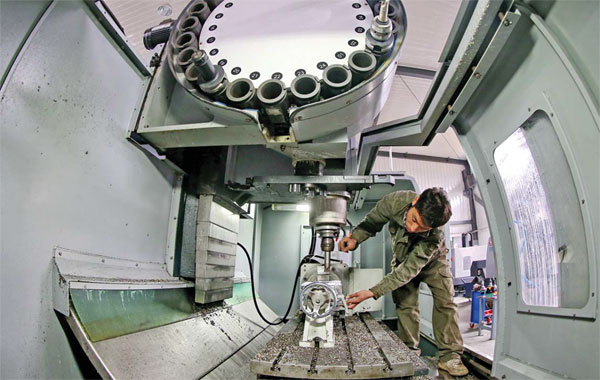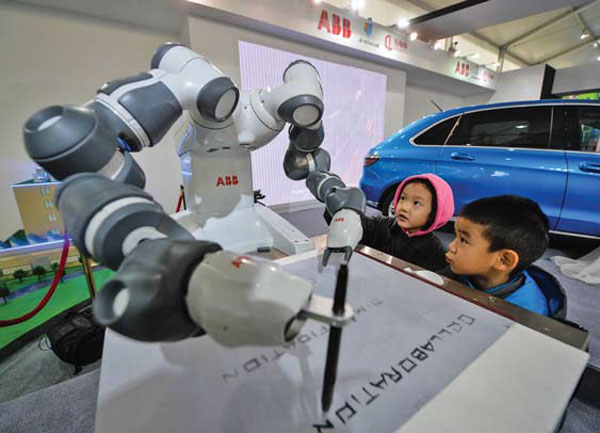A glimpse of the future

Amid global uncertainties - not least a new US presidency - China plots a steady course of continued progress and reform
President Xi Jinping is set to make a case defending globalization at the World Economic Forum meeting in Davos.
He will make clear the world's second-largest economy's commitment to being a key driver of world trade.
The theme of the forum, which runs from Jan 17 to 20, is "Responsive and Responsible Leadership". Klaus Schwab, founder and executive chairman of the Geneva-based international organization, welcomed China's involvement.

"China is an emerging superpower, and we expect the country to play an increasingly active role as a responsive and responsible global leader," he says.
"Areas where we are already seeing this happen include catalyzing support for protecting the environment, acting as a champion for international trade and investment, supporting development and infrastructure finance and moving to develop and expand the global digital economy."
Despite increasing fears of protectionism, economic ties can continue to flourish between industrializing Asia and developed Europe.
On China's part, everyone agrees that some big challenges remain - Trump provocations (or political distractions), domestic debt, or capital outflow to court potentially high returns from the overseas (mainly American) markets.
The Central Economic Work Conference, held in Beijing in mid-December, was used to deal with exactly these challenges.
China's top-level decision-makers hold such a conference each December to map out development strategies and targets for the next year. Key targets will not be revealed until they are proposed to the National People's Congress in early March, when targets become official.

But enough information can be obtained by China business watchers from the communique of the Central Economic Work Conference, which is in effect a carefully-worded statement of all major strategies for the next year.
Some overseas commentators said what they read from the communique was a general approach of putting stability first and reform second, leaving the impression that Beijing will never muster enough resolve, even though its leaders have made great strides in building a more solid power base through an unprecedented anti-corruption campaign over the past few years.
China has to take necessary precautions in reform. A lot of time is needed because it is a completely different game for local officials, who began their careers when GDP, and almost nothing else, served as the measure of their performance.
In 2017, stability is still important, if not even more so now that a change in the US administration and its possible China policy are bringing in an additional sense of uncertainty.
But stability doesn't mean a standstill or no change. Reform won't stop, even if it can't proceed by leaps and bounds as it did in earlier days, such as when the special economic zones were just being launched in the 1980s. That was a time when China's per capita GDP was only around $300. Now, it is $8,200.
What is in the nation's best interest is to progress with reform amid stability. Stability is guarantee for reform.
The ongoing clean-government movement requires more than frequent reports and checks on officials' conduct in office and with public funds. They are also expected to carry out more economic tasks than just enlarging the local GDP. In the nation's 13th Five-Year Plan (2016-20), rigorous targets are set for social development and environmental protection.
Some economic targets do not even require growth in numbers. One example is the task, assigned two years ago and yet to be completed, to slash industrial capacity - most noticeably the closure of some steel mills. It is aimed at helping the world's steelmakers and reducing pollution.
As serious readers will realize, the communique said, 2017 will be a more demanding year for reform.
Cutting excessive industrial capacity, inventory, borrowing, operational costs and whatever shortcomings exist in management and production is a task to be continued from 2016.
New tasks abound. One area to watch is reform of the public-private partnership scheme, sometimes called the mixed-ownership scheme, in state-owned enterprises. It is something that China has been talking about for the last few years but, since being included in the top leaders' 60-point decision on reform in 2013, it has been put into practice in only a small number of pilot projects, as with all reform programs in their initial stage.
There were rumors that an overall PPP program was being drawn up for some national-level large SOEs. But, as the Chinese like to say, conditions were still not quite right for introducing PPP nationwide.
By contrast, in 2017, according to the communique, some "concrete steps" will be taken in industries ranging from power generation and grid, oil and gas, railways, airlines, telecommunications and defense systems.
Although accomplishment of the whole PPP program is likely to take a few years, once implemented it will amount to a second remaking of the Chinese SOE system, after its first major reform in the early 1990s, overseen by the premier Zhu Rongji. Even amid the bold changes of Zhu's time, having private investment in defense companies was beyond anyone's imagination.
Apart from the above-mentioned changes, progress is planned in many areas. In general, it features two things. One is the domestic and the other the legal side of economic reform, especially protection of the property rights of companies and private citizens.
Thanks to all the efforts since the 2008 global crisis to maintain stability while seeking development, China has developed a more balanced economic system. Its focus has grown from chasing ever-faster growth to building a lasting institution.
The Central Economic Work Conference also pledged new efforts, including:
In agricultural reforms, to focus on the definition and protection of land rights;
In industrial reforms, to focus on boosting innovation and helping small and medium-sized enterprises;
In the real estate market, to restrict speculative investment in urban residential housing units;
In the regional development strategy, to focus on the country's existing key urban belts;
In the economic legal system, to strengthen the protection of property rights and redress wrong court rulings in this regard;
In the financial system, to clarify fiscal interests and responsibilities between the central and local governments, while making regulation more effective in the financial market.
Of course, the Central Economic Work Conference has painted a far-from-detailed picture of business in China in 2017. It is a framework, in which policies and the methods of their implementation can be adjusted according to conditions and possibilities.
But the framework is expected to remain stable. It is especially important when, in all likelihood, China's international environment will deteriorate if the Trump administration acts as its boss repeatedly pledged during his election campaign.
As some observers say, what the world will see from the Trump administration will not be a simple version of isolationism, but unilateralism. Other economies, as a result, may feel pressured to take initiatives by themselves instead of counting on the US market. More than ever before, China will have to depend on its own economy for growth.
But just as Marcus Aurelius said, time is everyone's equal possession. While Trump plays his own unilateral game, other countries can also develop their games. Four years is not a short time, as long as there isn't a major disaster. It is enough for China to make changes, and come out stronger as a more resourceful business partner for all countries in the world.
Contact the writers at edzhang@chinadaily.com.cn and andrewmoody@chinadaily.com.cn
| An employee works at a factory in Qian'an, Hebei province. Companies in the city, most related to the steel industry, are trying to update their industrial chains and eliminate outdated capacity. Yang Shiyao / Xinhua |
| A robot at an exhibition in Zhenjiang, Jiangsu province. In industrial reforms, China focuses on boosting innovation and helping small and medium-sized enterprises. Li Chunpeng / Xinhua |
(China Daily European Weekly 01/13/2017 page1)
Today's Top News
- Xi calls for promoting volunteer spirit to serve national rejuvenation
- Xi chairs CPC meeting to review report on central discipline inspection
- Reunification will only make Taiwan better
- Outline of Xi's thought on strengthening military published
- Targeted action plan to unleash consumption momentum
- Separatist plans of Lai slammed
































